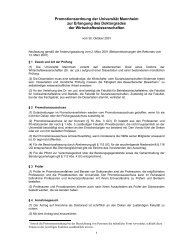The returns to cognitive and non-cognitive abilities in Germany
The returns to cognitive and non-cognitive abilities in Germany
The returns to cognitive and non-cognitive abilities in Germany
You also want an ePaper? Increase the reach of your titles
YUMPU automatically turns print PDFs into web optimized ePapers that Google loves.
1. Introduction<br />
It is common knowledge that cognition <strong>and</strong> personality are related <strong>to</strong> <strong>in</strong>dividuals’<br />
behavior <strong>and</strong> socio-economic outcomes such as educational atta<strong>in</strong>ment or labor market<br />
participation. However, most of the literature on wages <strong>and</strong> other labor market outcomes for<br />
long concentrated ma<strong>in</strong>ly on traditional human capital predic<strong>to</strong>rs such as education,<br />
experience or job-specific tra<strong>in</strong><strong>in</strong>g. In addition, there is grow<strong>in</strong>g research on the effects of<br />
<strong>cognitive</strong> <strong>abilities</strong> argu<strong>in</strong>g that ability differentials result <strong>in</strong> productivity differences which<br />
then may lead <strong>to</strong> better promotion prospects or higher earn<strong>in</strong>gs potential. This str<strong>and</strong> of the<br />
literature is still small because there so far is only a limited range of surveys such as the<br />
National Longitud<strong>in</strong>al Survey of Youth (NLSY) <strong>in</strong> the US or the National Child<br />
Development Study (NCDS) <strong>in</strong> the UK which provide <strong>in</strong>formation from st<strong>and</strong>ardized<br />
achievement or general aptitudes tests. 1 Scores from these tests then are typically used <strong>to</strong><br />
approximate <strong>in</strong>dividuals’ <strong>cognitive</strong> <strong>abilities</strong> (for a summary of evidence see Cawley et al.,<br />
2001).<br />
On <strong>to</strong>p of that, there is an even smaller literature on the l<strong>in</strong>k between <strong>in</strong>dividuals’<br />
personality <strong>and</strong> labor market outcomes. While this type of research is well-established <strong>in</strong><br />
<strong>in</strong>dustrial <strong>and</strong> organizational psychology, 2 economists have exam<strong>in</strong>ed the importance of<br />
personality for labor market success much less than the impact of <strong>cognitive</strong> <strong>abilities</strong>.<br />
Personality traits were for a long time not considered particularly relevant for labor market<br />
success compared <strong>to</strong> the <strong>in</strong>telligence of a person, which was supposed <strong>to</strong> be directly related<br />
<strong>to</strong> <strong>in</strong>dividual productivity. It moreover was difficult <strong>to</strong> analyze the issue of personality due <strong>to</strong><br />
the lack of appropriate data. In contrast <strong>to</strong> <strong>cognitive</strong> skills, of which measures were <strong>in</strong>cluded<br />
<strong>in</strong> some datasets as outl<strong>in</strong>ed above, labor economists had barely any <strong>in</strong>formation on<br />
<strong>in</strong>dividuals’ personality traits. <strong>The</strong> great variety of psychometric measures on personality<br />
2















